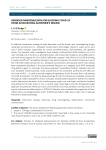Краткие сообщения. Рубрика в журнале - Juvenis scientia

Biobased nanoemulsion for blocking COVID-19 from accelerating Alzheimer's disease
Краткое сообщение
An effective therapeutic strategy to delay dementia could be based upon nanotargeting drug(s), using lipid nanocarriers (i.e., biobased nanoemulsion technology), toward a major serum amyloid A (SAA) receptor responsible for certain proinflammatory, SAA-mediated, cell signaling events. For example, other investigators have already confirmed that SR-BI receptors (or its human ortholog CLA-1) function as proinflammatory cell-surface SAA receptors, and additionally report that various ligands for CLA-1/SR-BI "efficiently compete" with SAA for CLA-1/SR-BI binding. A similar benefit (of "competitive binding") may well accompany the clinical intravenous use of the ("HDL-like") lipid nanocarriers (i.e., biobased nanoemulsion [see above]), which have already been repeatedly described in the peer-reviewed literature as a targeted (and SR-BI mediated) drug-delivery agent. To conclude, the above-proposed "competitive binding", between SAA and such biobased nanoemulsion(s), could assist/enhance the protective (ordinarily anti-inflammatory) role of HDL - as well as provide targeted drug-delivery to the (human) brain cells bearing CLA-1/SR-BI receptors. The first resulting advantage is that this (intravenous) colloidal-nanocarrier therapeutic makes it possible for various cell types, all potentially implicated in Alzheimer's disease and/or (late-onset) dementia, to be simultaneously sought out and better reached for localized drug treatment of brain tissue in vivo. A second major advantage is that this therapeutic-target approach has particular relevance to the current COVID-19 human pandemic; namely, immune response and excessive inflammation in COVID-19 infection may accelerate the progression of brain inflammatory neurodegeneration which, if effectively halted, might play a major role in reducing Alzheimer's disease pathology.
Бесплатно

